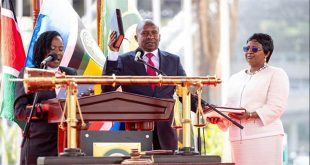The ruling Democratic Party of Equatorial Guinea maintained its grip on power during the November 12 vote, winning 99 of the parliament’s 100 seats, while CI won the other.
The vote was widely criticised by the opposition as fraudulent.
The trial is linked to scuffles which occurred a week before the vote when police tried to stop a campaign rally in Aconibe, the hometown of CI’s leader, in which three police were hurt and their weapons — three AK-47 assault rifles and a pistol — were seized.
Speaking to AFP, a regional diplomatic source said that “90 percent of the defendants were not even present” at the time. Those on trial include individuals who had been arrested in Malabo, the capital, and in the port city of Bata, the source said.
Last month, the CI said one of its activists had died in custody after being tortured, saying he was one of about 200 supporters who had been arrested since November.
Although the activist’s death was confirmed in an interview with Obiang, who is Africa’s longest-serving president, he denied claims of “mistreatment” and said it was due to ill health.
Earlier this month, the EU denounced a “sharp decline” in human rights following the election and urged legal process to be fair and in line with international norms.
In the mid-1990s, Equatorial Guinea became one of sub-Saharan Africa’s biggest oil producers. But little of the wealth has trickled down — about two-thirds of its 1.2 million people live below the poverty line.
In 2015, Nguema announced a referendum would be held on the death penalty but the vote has never taken place.
 The Independent Uganda: You get the Truth we Pay the Price
The Independent Uganda: You get the Truth we Pay the Price


